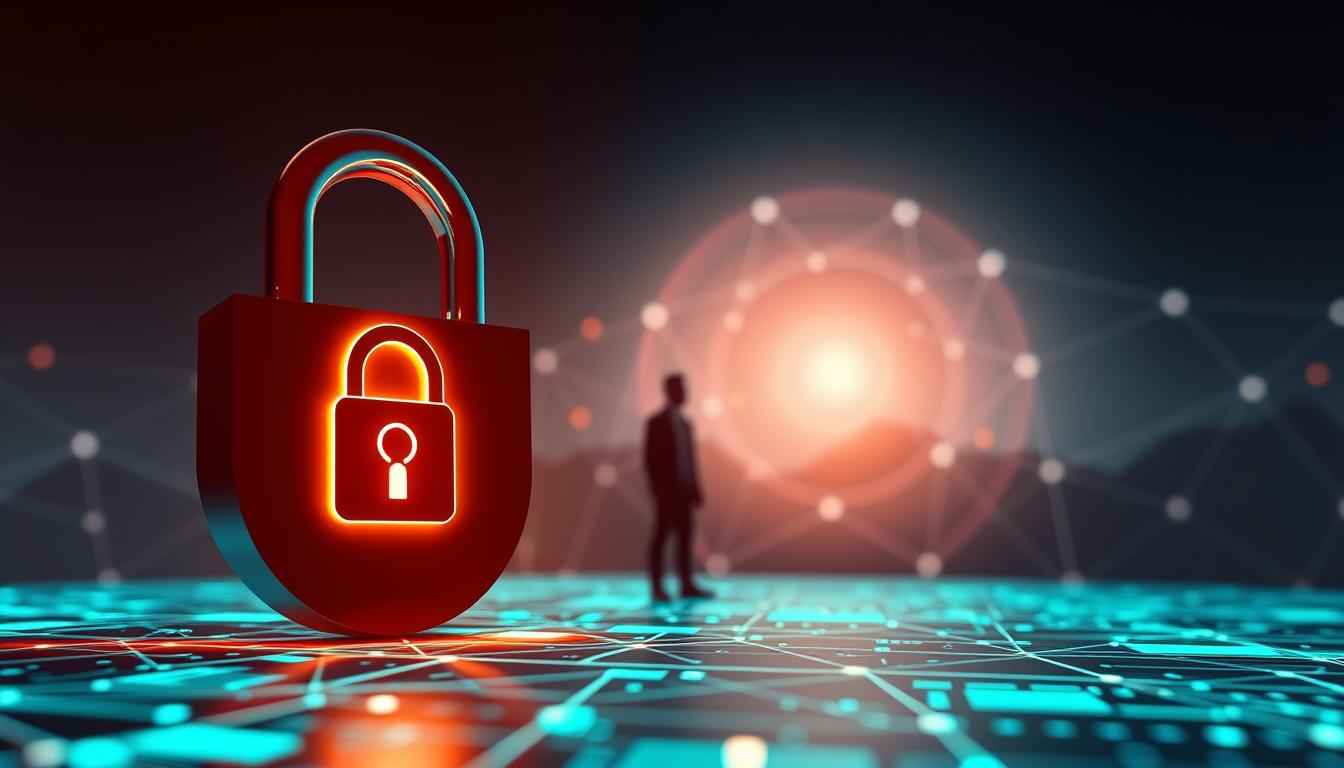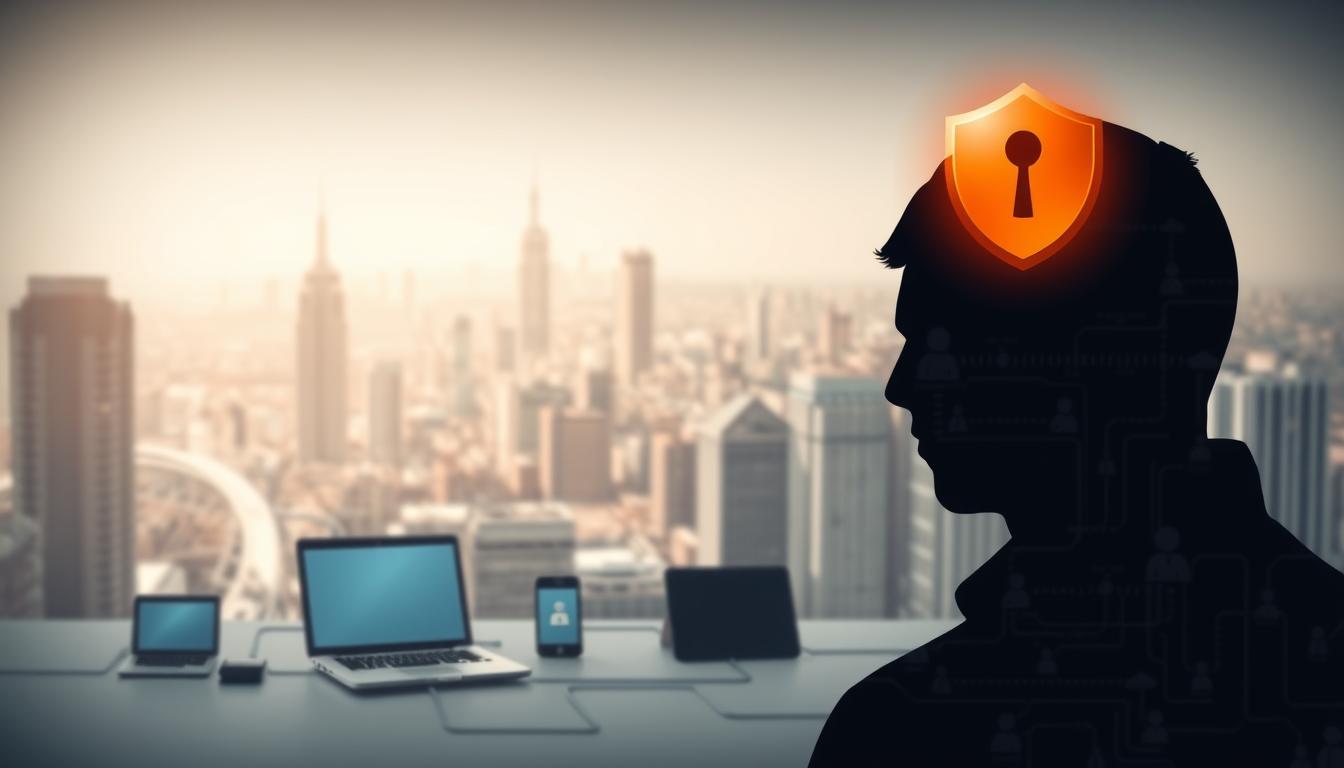Do you think you’re browsing privately? Think again. Today, every site you visit can track you. Defending your online security is more imperative than ever. Public Wi-Fi connections make your sensitive data easy prey for cybercriminals.
A Virtual Private Network (VPN) adds a strong layer of protection. It encrypts your internet traffic and hides your IP address. This gives you control over your digital privacy with just one click. As threats to your online privacy grow, understanding VPN benefits is crucial.
This article will explore the main advantages of using a VPN. It will show how it boosts your online security, keeps your information hidden, and protects you from data spying and tracking.
Key Takeaways
- Employing a VPN altogether improves your online security and security.
- A VPN encrypts your internet traffic, protecting sensitive information.
- It masks your IP address, helping maintain anonymity while browsing.
- VPNs protect against information spying and following by third parties.
- Utilizing a VPN on public Wi-Fi is essential for safe internet usage.
- Choosing the right VPN can determine the level of digital safety you achieve.
What is a VPN and How Does it Work?
A VPN, or virtual private network, is key for keeping your online life private. It’s important to know how it works to see its value in today’s digital world. VPNs make a secure link between your device and the internet, keeping your info safe from being caught.
Understanding Virtual Private Networks
At its heart, a VPN stows away your genuine IP address. It sends your internet use through an encrypted server. This creates a private path for your data, keeping it safe from unwanted eyes. Using a VPN boosts your online safety and privacy, making it tough for hackers to get to your data.
How VPNs Encrypt Internet Traffic
Encryption is crucial for VPNs to protect your data. When you use a VPN, it uses strong encryption like AES-256 to secure your internet traffic. This turns your data into unreadable code, keeping it safe from anyone who might try to intercept it. This ensures your online actions stay private, safe from internet providers and cybercriminals.
Benefits of Using a VPN for Privacy
Using a VPN offers many benefits for your privacy and online experience. It helps with online security, hides your IP address, and stops data spying. This makes your internet use safer and more private.
Improved Online Security
One big advantage of a VPN is better online security. It scrambles your web activity, securing you from programmers and cyber threats. This is very important when using public Wi-Fi, where your data is at risk.
Hiding Your IP Address
A VPN covers up your IP address, making it difficult for others to track you online. This adds a layer of anonymity, which is very valuable today. It helps keep your online activities private.
Preventing Data Spying and Tracking
Being able to halt online following is key for privacy. A VPN stops your data from being tracked, giving you control over your browsing. This makes your internet use more secure and private.
Employing a VPN on Open Wi-Fi: Why It Matters
In today’s world, using public Wi-Fi is common. But, these networks pose big risks to your data and privacy. It’s vital to know the dangers to remain secure online.
Risks of Public Wi-Fi Connections
Public Wi-Fi networks are often not secure. This makes it easy for hackers to get your personal info. Some common dangers include:
- Packet sniffing: Bad guys can grab data that’s not encrypted.
- Man-in-the-Middle attacks: Hackers can change what you send and get back.
- Rogue hotspots: Fake Wi-Fi spots can steal your data without you knowing.
How a VPN Secures Your Browsing
Using a VPN is a great way to fight these threats. A VPN scrambles your web, making it difficult for programmers to induce your data. This keeps your browsing safe on public Wi-Fi. The main benefits of a VPN are:
- Data encryption: Your data is safe because it’s encrypted.
- IP address hiding: Your real IP address is hidden, so you can’t be tracked.
- Access to safer browsing: Your data is secure, lowering the chance of identity theft.
In a world full of cyber threats, using a VPN on public Wi-Fi is key. It keeps you safe and lets you enjoy the internet more.
Geo-Restriction and Access Control
Many people love streaming services and digital content. But, they often face limits because of where they are. A good VPN can help by changing your internet path to another country. This way, you can see content that was not available before.
This not only grows your digital collection. It also lets you browse anonymously and safely.
Bypassing Geo-Blocked Content
Geo-restricted content can be a real problem. But, the right VPN can solve this issue. By connecting to a server in another place, you can see websites and streaming services that are blocked where you are.
For example, if you’re abroad and want to watch your favorite shows from home, a VPN makes it possible. It keeps your online activities private while giving you free access to many platforms.
Accessing Restricted Services Securely
A VPN does more than just get you past location limits. It also keeps your online experience safe. It encrypts your data, so your information stays private from others.
This security is key when you’re using sensitive services. You can explore content that’s not available in your area without worrying about your safety or privacy.
Free Vs. Paid VPNs: What You Need to Know
Choosing between free and paid VPNs is a big decision. Each has its claim to great and terrible focuses. Knowing these can help you pick the best way to keep your data safe.
The Risks of Using Free VPN Services
Free VPNs might seem like a good deal, but they can be risky. Many free services sell your data to make money. This goes against what a VPN is meant to do: keep you private.
Free VPNs also don’t have strong encryption or good customer support. This means you could face data breaches and malware. Your personal info could be at risk.
Key Features to Look for in a Paid VPN
Paying for a VPN can make a huge difference. Look for these important features:
- Strong encryption protocols to keep your data safe.
- No-logs policy to make sure your online activities are private.
- A large server network for better speed and access.
- User-friendly applications that make it easy to connect and use.
Services like ExpressVPN, NordVPN, and CyberGhost offer these features. They help protect your data and make your online experience safer. A great paid VPN gives you peace of intellect online.
Conclusion
Using a VPN for privacy has many benefits. It makes your online activities safer and keeps your personal info private. It also helps you stay anonymous online.
With digital privacy risks growing, using a VPN is now a must. It’s not just a choice anymore.
Knowing how VPNs work and picking a reliable provider is key. This helps you stay safe on public Wi-Fi. It also keeps your sensitive data secure.
By using a VPN, you’re taking a big step to protect yourself online. This is important as online threats keep getting worse. Your choice to use a VPN is a smart move for your digital safety.








GIPHY App Key not set. Please check settings